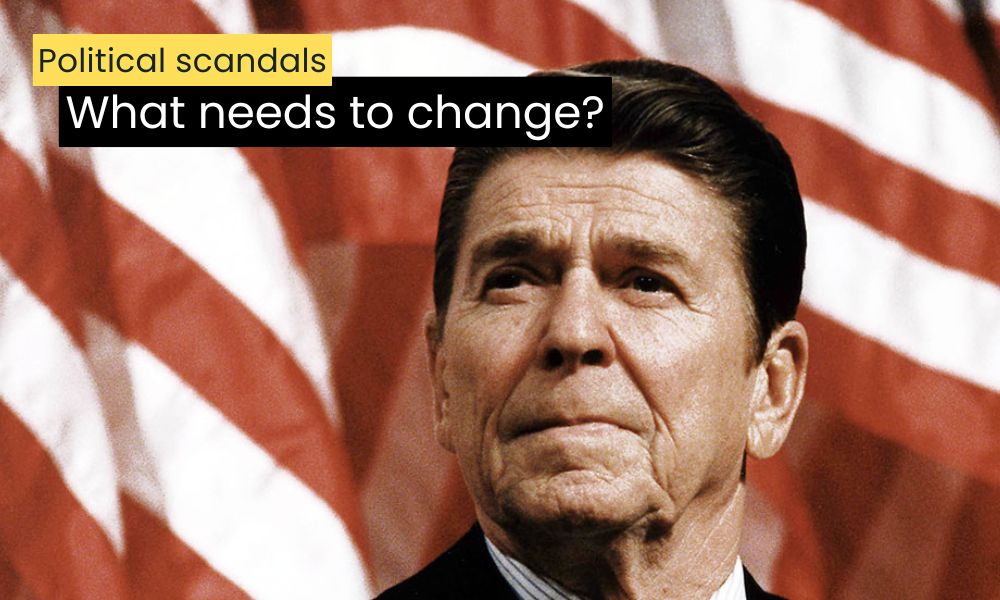Reflecting on lessons learned from the major scandals in U.S. political history and what reforms are needed to prevent future controversies.
Lessons from Political Scandals
- Controversies have exposed systemic flaws in governance, accountability, and public ethics
- Recurring scandals highlight the persistent need for stronger safeguards and cultural shifts within its political system
What the U.S. Has Learned
Political scandals are often seen as moments of crisis, but they also offer valuable opportunities for reflection and reform. From Watergate to the Trump impeachments, these controversies have exposed systemic flaws in governance, accountability, and public ethics. While the U.S. has learned critical lessons from these events, recurring scandals highlight the persistent need for stronger safeguards and cultural shifts within its political system. Reflecting on the past can help identify what must change to rebuild trust and ensure the integrity of democratic institutions.
The Evolution of Scandal Responses

One of the clearest lessons from U.S. political scandals is the importance of transparency and accountability in maintaining public trust. Watergate, often regarded as the gold standard of political investigations, demonstrated how thorough investigative journalism, coupled with robust congressional oversight, could expose corruption at the highest levels. The scandal not only led to President Richard Nixon’s resignation but also spurred reforms like the Ethics in Government Act of 1978, which established mandatory financial disclosures for public officials and created the Office of Special Counsel.
Similarly, the Iran-Contra affair of the 1980s revealed the dangers of unchecked executive power and covert operations. While President Ronald Reagan avoided direct culpability, the fallout emphasized the need for stricter oversight of foreign policy and arms transactions. The lessons from these scandals underscore the necessity of institutional checks and balances to prevent abuses of power.
Persistent Challenges
Despite the reforms inspired by past scandals, systemic issues remain. Campaign finance scandals, such as those revealed during the Jack Abramoff lobbying investigation, continue to highlight the influence of money in politics. Efforts like the McCain-Feingold Act sought to address this by limiting campaign contributions and soft money, but loopholes and court rulings, including Citizens United v. FEC (2010), have eroded these protections.
Another recurring theme is the struggle to hold leaders accountable in the face of partisanship. The impeachments of Presidents Bill Clinton, Donald Trump, and Andrew Johnson demonstrated how party loyalty can overshadow facts, making impeachment as much a political tool as a mechanism for accountability. This polarization reduces the efficacy of scandal responses and undermines public confidence in democratic processes.
What the U.S. Has Learned
- The Power of Oversight: Independent investigations and bipartisan oversight bodies are crucial in uncovering the truth and ensuring justice. The success of the 9/11 Commission in delivering a comprehensive report highlights how impartial inquiries can restore public confidence.
- The Role of Media: Investigative journalism remains a cornerstone of democracy. From Watergate to the Pentagon Papers to modern exposés like the Panama Papers, a free press is vital in holding power to account.
- The Importance of Ethical Leadership: Scandals often stem from a culture that tolerates or incentivizes unethical behavior. Leaders set the tone for their administrations, and fostering a culture of integrity can help prevent misconduct.
What Needs to Change
- Campaign Finance Reform
Despite past efforts, money continues to wield disproportionate influence in U.S. politics. Comprehensive reforms are needed to close loopholes, limit corporate and foreign contributions, and improve transparency in political donations. - Stronger Whistleblower Protections
Many scandals come to light thanks to whistleblowers, yet these individuals often face retaliation. Strengthening protections and ensuring anonymity can encourage others to come forward without fear of retribution. - Enhanced Oversight Mechanisms
Institutions like the Department of Justice and congressional committees must operate independently of political pressures. Codifying norms into law—such as protecting the independence of special counsels—can prevent interference in investigations. - Public Education on Media Literacy
Modern scandals are often amplified or distorted through social media, creating confusion and polarization. Educating the public on discerning credible information from disinformation can help ensure a more informed electorate. - Addressing Partisan Polarization
Bridging the partisan divide is essential for ensuring fair responses to scandals. Encouraging bipartisan cooperation and reforming gerrymandering and election laws can reduce polarization and promote more balanced governance.
The Broader Cultural Shift
Beyond structural reforms, the U.S. must address the cultural factors that allow scandals to persist. Normalizing ethical behavior in public office requires a collective commitment to integrity and accountability, not just from political leaders but also from voters, media outlets, and advocacy groups.
Public engagement plays a vital role in holding officials accountable. Civic activism, as seen during the post-Watergate era, can push for meaningful reforms and demand higher standards from those in power. However, this requires overcoming cynicism and disillusionment, which scandals often exacerbate.
Common FAQs
What was the Watergate scandal in simple terms?

The Watergate Scandal revolved around members of a group associated with Nixon’s 1972 re-election campaign breaking into and planting listening devices in the Democratic National Committee headquarters at the Watergate Office Building in Washington, D.C., on June 17, 1972, and Nixon’s later attempts to hide his administration’s involvement.
Clinton-Lewinsky Scandal

The Clinton–Lewinsky scandal was a sex scandal involving Bill Clinton, the president of the United States, and Monica Lewinsky, a White House intern. Their sexual relationship began in 1995—when Clinton was 49 years old and Lewinsky was 22 years old—and lasted 18 months, ending in 1997.
What happens when a president is impeached twice

President Donald Trump was impeached twice during his first term in office. In each case, he was acquitted on all counts by the Senate. The first impeachment saw the Senate acquit Trump on both counts. Article I failed by a vote of 48-52 while Article II failed by a vote of 47-53. The second impeachment saw a majority of Senators vote to convict, Trump was ultimately acquitted by a vote of 57-43.


